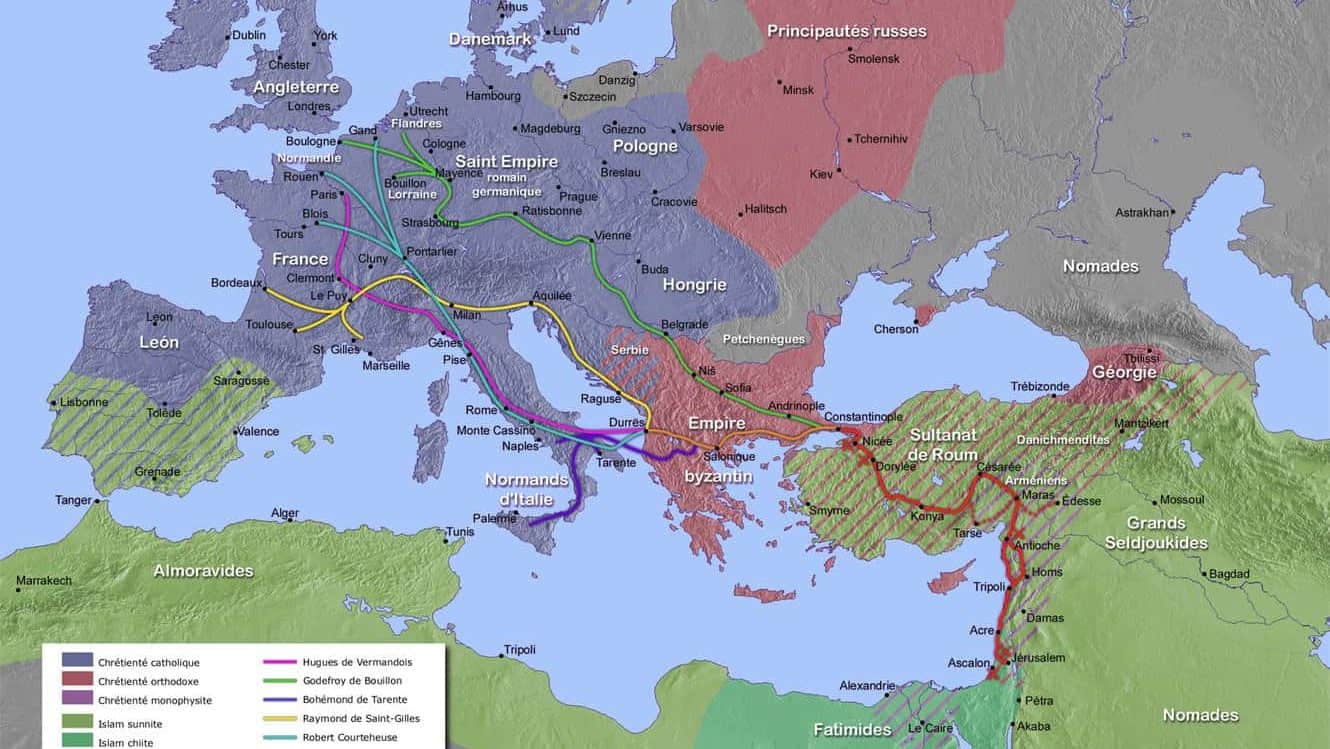In the annals of medieval history, the Kingdom of Jerusalem stands as a remarkable and complex chapter. Established during the enthusiasm of the First Crusade, this Christian realm in the heart of the Holy Land bore witness to a unique blend of faith, culture, and political intrigue. Let’s journey through time to explore the Kingdom of Jerusalem.
The Birth of a Kingdom:
- The Kingdom of Jerusalem was founded in 1099 after the successful capture of Jerusalem by the Crusaders. This conquest was pivotal in the First Crusade, fulfilling the primary goal of reclaiming the Holy City from Muslim control.
The First Crusade

Crusader States:
- The Kingdom of Jerusalem was one of several Crusader states established in the wake of the First Crusade. Others included the County of Edessa, the Principality of Antioch, and the County of Tripoli.
Ruling Monarchs:
- Godfrey of Bouillon, known for his humility and piety, was among the first rulers of Jerusalem. Despite his refusal to take the title of king, he effectively led the kingdom.
- Godfrey was succeeded by his brother, Baldwin I, who officially assumed the title of King of Jerusalem.
- The dynasty founded by Godfrey and Baldwin ruled Jerusalem for generations, including notable monarchs like Baldwin II and Baldwin IV (the Leper King).
Kingdom of Jerusalem – Religious Significance:
- Jerusalem held immense religious importance for Christians, Jews, and Muslims alike. The Crusaders viewed their kingdom as a sacred protectorate of Christianity, safeguarding holy sites like the Church of the Holy Sepulchre.
- The kingdom’s leaders, including the Knights Templar and the Knights Hospitaller, played a central role in defending these sites.
Cultural Exchange:
- The Kingdom of Jerusalem was a melting pot of cultures. Crusaders brought Western European traditions, while interactions with local Christian, Muslim, and Jewish communities enriched the region’s cultural tapestry.
Challenges and Decline:
- The kingdom faced constant threats from Muslim forces, particularly the formidable Salah ad-Din (Saladin).
- Internal strife, disputes among Crusader nobility, and the vast distances between the Crusader states challenged the kingdom’s stability.
- Jerusalem would change hands multiple times between Christian and Muslim forces in the following centuries.
Enduring Legacy:
- The Kingdom of Jerusalem left an enduring legacy in the history of the Crusades, symbolizing the Christian West’s desire to reclaim the Holy Land.
- Its complex and often tumultuous history continues to captivate historians, offering insights into the interplay of faith, politics, and culture during the Middle Ages.
The Kingdom of Jerusalem, though ultimately short-lived in its original form, remains a testament to the profound impact of the Crusades on the medieval world. Its story serves as a reminder of the enduring human quest for faith, conquest, and cultural exchange in the heart of the Holy Land.

